Read. Imagine. Travel.
Namaste! On the occasion of New Year, here we are hoping that it brings lot of new and exciting opportunities in our lives. We hope it will be our year. We wish you and your team a very happy and prosperous New Year 2022.
Throughout the past year, we have been exhilarated to share exciting stories about the Indian subcontinent with you. Your passion, patience, and loyalty have always bolstered us. Our partnership with you feels more precious and powerful than ever, as does our commitment. So here we are with another story about the “Coffee plantations in India”.

Exotic taste, rich aroma, mild and less acidic, a freshly brewed cup of an Indian coffee stimulates freshness with each sip. India is one of the largest coffee producing countries globally and it is also accredited for the finest quality. Thanks to the thick cover of rainforests and its terrain, which provides a shaded canopy, as rest everywhere in the world, coffee is grown under direct sunlight. You read it right ‘India is the only country that grows all of its coffee under shade’.
The introduction of coffee to India is quite interesting, if we go by the popular legend. It is believed that a Sufi saint ‘Baba Budan’ secretly brought seven green beans of coffee hidden in his beard while returning from Yemen. Well, that wasn't as simple as it seems. Until then, the Arabs had monopolized the coffee market. They ensured that seeds were not transported abroad and prohibited the transport of coffee beans in order to remain as exclusive coffee producers. Only roasted or boiled beans were exported, as they could not germinate. As soon as Baba Budan reached his hometown (in Karnataka), he planted the beans and initiated the cultivation of coffee in India. The hill where he seeded coffee is named after him as Baba Budan Giri. Watch a video about Coffees of India.
Interesting fact: The coffee is considered to be the most traded commodity globally after oil. Roughly, a daily consumption of around 2.25 billion cups of coffee is estimated worldwide.
The favourable climatic conditions helped growing coffee in other parts of Karnataka and neighbouring states of Tamil Nadu and Kerala.
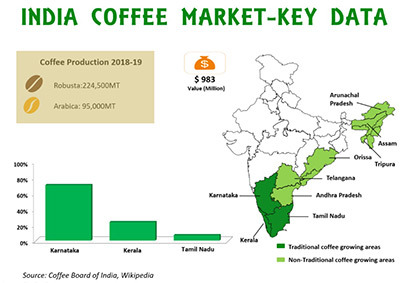
The state of Karnataka alone contributes 71% of the total coffee production in India, Kerala accounts for 21% of the production, and Tamil Nadu produces around 5%. Coffee plantations are encouraged in other parts of the country as well such as Andhra Pradesh, Odisha & the North Eastern states.
As most of the production happens in South India, the consumer base is also larger in Southern India. And it was here, a new type of coffee emerged called ‘Filter Coffee’, which was made out of roasted coffee beans and Chicory (a plant, whose roots are baked, grounded, and used as a coffee additive or a coffee substitute) combined with milk. Filter coffee received a wide acceptance and became a commercial success.
Surprisingly, the journey which started in the 16th century saw opening of commercial coffee houses much later around the 18th century. A special story about a leading coffee house makes an interesting part of this journey. Indian coffee house, which has a strong presence today with around 400 outlets spread across India, was once declared bankrupt by the then management. The workers, who got upset by the decision initiated a movement which later resulted in the formation of workers' cooperative society. This was one of its kind where the chain was run by worker-members contrary to owner-run companies. The first coffee house was opened in Mumbai with the name 'Indian Coffee House.'
Interesting fact: India is the creator of the famed ‘Monsoon Malabar’ a speciality coffee and a process unique to India. It dates back to the old days when green coffee beans from India were shipped to Europe, the sea winds and humidity in it caused the beans to change colour, swell and age. The resultant flavour won connoisseurs over. To achieve the same the beans are now ‘monsooned’ to replicate the conditions that produced this singular coffee.
The surroundings which help in the cultivation of coffee also make the experience for its admirer more interesting and vast. The coffee plantation is mostly intercropped with spices like cardamom, cloves, cinnamon, pepper, etc. which eventually contributes aroma to coffee. Imagine the experience of trekking through the aromatic coffee plantations. The experience does not end here as one can also indulge in an informative spice plantation tour to learn how these spices are important for our wellness and how they take an important space in the Indian kitchens. One can also enjoy the natural spectacle of serene hills touching the clouds, diverse ecosystem and an opportunity to spot wildlife and migratory birds continuously flocking these coffee plantations.


 The state of Karnataka alone contributes 71% of the total coffee production in India, Kerala accounts for 21% of the production, and Tamil Nadu produces around 5%. Coffee plantations are encouraged in other parts of the country as well such as Andhra Pradesh, Odisha & the North Eastern states.
The state of Karnataka alone contributes 71% of the total coffee production in India, Kerala accounts for 21% of the production, and Tamil Nadu produces around 5%. Coffee plantations are encouraged in other parts of the country as well such as Andhra Pradesh, Odisha & the North Eastern states.
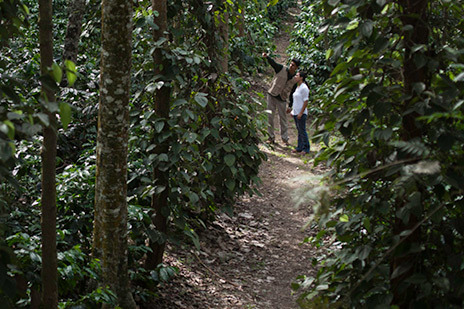 It is the place where the first seeds of coffee were planted and is today the largest contributor of coffee in Karnataka. The soil of this area is so rich that Chikamagalur grows multiple varieties of coffee.
It is the place where the first seeds of coffee were planted and is today the largest contributor of coffee in Karnataka. The soil of this area is so rich that Chikamagalur grows multiple varieties of coffee.
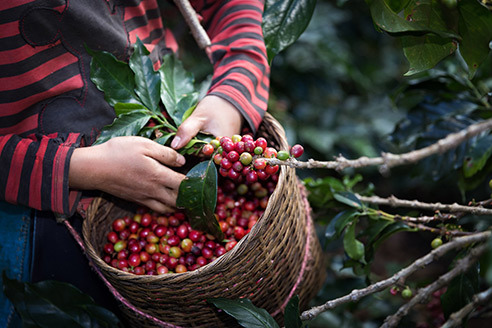 Another place that contributes a sizeable coffee volume to Karnataka's production, Coorg is a beautiful hill station known for its pleasant weather throughout the year. A visit to any of the coffee estates here will give one a deep understanding of the complete process that coffee goes through, from the seed to cup. Coorg, also offers numerous opportunities for trekking and walks amidst beautiful surroundings.
Another place that contributes a sizeable coffee volume to Karnataka's production, Coorg is a beautiful hill station known for its pleasant weather throughout the year. A visit to any of the coffee estates here will give one a deep understanding of the complete process that coffee goes through, from the seed to cup. Coorg, also offers numerous opportunities for trekking and walks amidst beautiful surroundings.
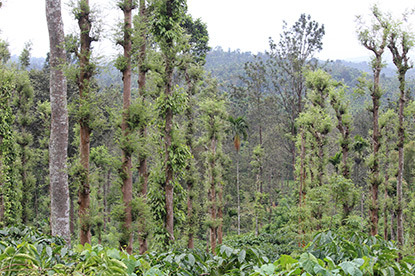 Scenery, with thick and lush green rain forests surrounding coffee plantations and mountains of the Western Ghats in the backdrop comes to mind when we speak or think of Wayanad. One of Kerala's largest coffee producers this tiny town bordering Karnataka is a nature's paradise.
Scenery, with thick and lush green rain forests surrounding coffee plantations and mountains of the Western Ghats in the backdrop comes to mind when we speak or think of Wayanad. One of Kerala's largest coffee producers this tiny town bordering Karnataka is a nature's paradise.
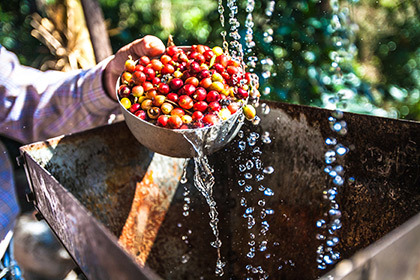 Yercaud got its name because of its location, which means a thick forest alongside the lake (Yeri= Lake and Kaadu= forest). While coffee plantations and treks are the highlights of the town, it is also known for orange plantation. While in Yercaud, visit India's first-ever coffee plantation owned by an Indian. Established in 1960, today fourth and fifth generation is taking care of it.
Yercaud got its name because of its location, which means a thick forest alongside the lake (Yeri= Lake and Kaadu= forest). While coffee plantations and treks are the highlights of the town, it is also known for orange plantation. While in Yercaud, visit India's first-ever coffee plantation owned by an Indian. Established in 1960, today fourth and fifth generation is taking care of it.
 What sets this planation apart from others is its production of organic coffee. The tribes at Araku valley grow coffee without using any chemical fertilizers and apply traditional methods of coffee cultivation.
What sets this planation apart from others is its production of organic coffee. The tribes at Araku valley grow coffee without using any chemical fertilizers and apply traditional methods of coffee cultivation.
 We can conduct a virtual destination awareness training program for your team or yourself or a virtual tour for your clients. Let us know the destination of your interest along with your convenient date / time and we will be happy to set up a program for you.
We can conduct a virtual destination awareness training program for your team or yourself or a virtual tour for your clients. Let us know the destination of your interest along with your convenient date / time and we will be happy to set up a program for you.

